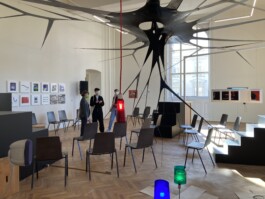von: Miriam
Störung / Suche / Heterotopische Zwischenräume
zuletzt
∗ Symposium »Feminist Infrastructural Critique Interdependencies of Bodies, Materials, and Technologies«, Akademie der bildenden Künste Wien
Caring for Urban Infrastructures: A Feminist Critique
When speaking about urban infrastructures we are mainly referring to housing, road and mobility systems or electronical and digital networks. But isn’t this material view reductionist? A feminist concept of care counters this view with a perspective that sees urban infrastructures as embedded in a network of reciprocal social relations and that understands this network itself as an urban infrastructure – as an “infrastructure of care”. Thus, care not only broadens the understanding of urban infrastructures, but also offers the starting point for an infra-political perspective. Due to this perspective, infrastructural connectedness can be uncovered and its underlying “rules” – hegemonic settings of hierarchies and inscribed power differences regulating infrastructural access – can be questioned. Therefore, care as an infra-political perspective is not only part of a feminist critique of urban infrastructures but also the starting point for imagining a caring design of these infrastructures – a caring urbanism.

von: Miriam
Störung / Suche / Heterotopische Zwischenräume
zuletzt
∗ Symposium »Feminist Infrastructural Critique Interdependencies of Bodies, Materials, and Technologies«, Akademie der bildenden Künste Wien
Caring for Urban Infrastructures: A Feminist Critique
When speaking about urban infrastructures we are mainly referring to housing, road and mobility systems or electronical and digital networks. But isn’t this material view reductionist? A feminist concept of care counters this view with a perspective that sees urban infrastructures as embedded in a network of reciprocal social relations and that understands this network itself as an urban infrastructure – as an “infrastructure of care”. Thus, care not only broadens the understanding of urban infrastructures, but also offers the starting point for an infra-political perspective. Due to this perspective, infrastructural connectedness can be uncovered and its underlying “rules” – hegemonic settings of hierarchies and inscribed power differences regulating infrastructural access – can be questioned. Therefore, care as an infra-political perspective is not only part of a feminist critique of urban infrastructures but also the starting point for imagining a caring design of these infrastructures – a caring urbanism.
